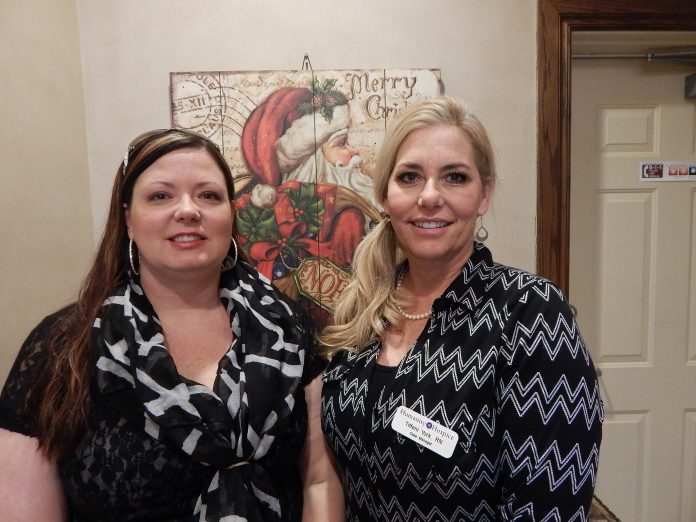
by James Coburn
Staff Writer
It’s the families, patients and teaching that keep Tiffeni York focused on hospice care, said York, RN, Humanity Hospice in Oklahoma City. A nurse since 1993, York did level 1 trauma and ICU until she decided to work in hospice in 2002.
York knows what it’s like to have a life threatening injury. Her experience led her to become an RN.
“I was in a really bad car wreck,” York said. “I kind of thought about it for a little bit. I had to go home for a year. I was in the middle of college and I loved my nurses. And I signed up during that time and got into nursing school.”
She recently moved to Oklahoma from Texas and came to work at Humanity Hospice in October.
When she first began doing hospice work, York worked with one of the founding physicians of hospice. He was the doctor who helped get physicians certified in hospice care, she said.
“I learned hospice the right way,” York said. “Humanity does things the way I was taught to do things about patient care. The patients and the families are at the core, and it’s not about the get-in, get-out visits. It’s truly about the patients.”
So York feels comfort knowing that Humanity Hospice follows patient centered care, as it should as well as Medicare guidelines.
“It’s a perfect fit,” she said.
She credited Moluk Bavi, RN, director of Clinical Services for her leadership.
“She is the glue that holds us together. She is awesome, York said. “She’s our core. She knows it and understands hospice. We have a great team here. Humanity is a continuance for me of doing hospice the right way.”
She had several patients as an ICU nurse who had passed away. One of her friends told her to consider hospice.
At that time patients could stay longer in a hospital, unlike today when the federal government sets limits and patients enter skilled nursing care.
“The first patient that ever died, I was very close to her,” York said. “She had been in the hospital for almost two years back in the 1990’s. She was in more than she was out.
When the time came for the woman to pass, a nurse told a grieving York, “It’s the closest to God you’ll ever be. Grab her hand. Say the Lord’s Prayer.”
Doctors offered to take care of nursing matters when York’s friend died, because they understood their relationship.
This experience gave rise to York’s nursing career. When she told all of her friends she wanted to work in hospice, they were surprised because they viewed her as an adrenaline junkie, York said.
“Hospice, I love it. It’s my heart. It’s my soul,” she said. “It feels right.”
The company she worked at in Texas sold. So she was involved in a new hospice. But having a third daughter led her to staying home for a couple of years.
She took a job as a cardiac device rep because it paid more money, she said.
“It killed me. I would go into the cath lab and work a case and I’d leave,” York said. “And it literally crushed my soul to see people who had perfectly good vessels in their legs and the cardiologist was still going to use my device because it padded his pocket.”
So at day’s end, York had no satisfaction in being a cardiac device rep, she said.
Today, her daughters sometimes say that she loves her patients as much as she loves them. Hospice patients become part of your life, York said.
“It’s more rewarding. You feel you’ve made a difference in someone’s life,” she said. “You have made a difference.”
Hospice takes a holistic approach to life. The same approach of mind, body and spirit also applies to nurses when enriching their own lives.
“I have three girls. There is constantly volleyball, tennis,” York said. “We go to the lake, we go to the mountains. We’re busy, busy bodies. I just told somebody I need three more of me.”
Sometimes the word hospice scares people, she said. People hear the word and refuse to believe it is time for them to face death, she said. Family members sometimes will say, “Don’t tell dad we’re signing him on hospice. I don’t want him to give up.”
Hospice is not about giving up on life, York said. Hospice is a benefit.
“If you meet Medicare guidelines to be on hospice, why wouldn’t you do it. You have more care. You have more nursing and doctors looking over your case. I’ve had patients that clearly qualify and with all the extra care, we’ve had to sign them off because they got better,” York said.
Hospice is a benefit that people do not realize, she said.
Amy Dyer is also a registered nurse for Humanity Hospice.
“As a nurse you get so much out of it,” she said. “I can’t believe that we get more than we’re able to help the patients sometimes.”
It’s a blessing for Dyer to be part of someone’s life at the end of life, she said.
“If you’re able to help those patients and family members and be a support for them, it’s just a blessing,” she said.
She’s gone to work every day to help people as a nurse.
Had hospice not been available to help her grandfather during his time of passing, his life would not have been as blessed, she said.
“They were just amazing and such a blessing. From that point on, I knew that’s what I wanted to do — to help families.”












